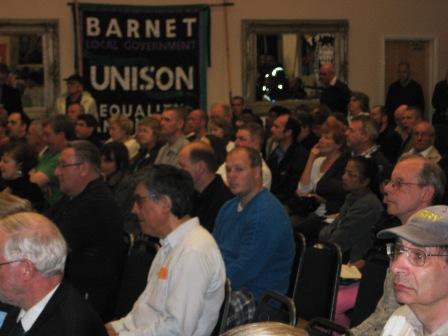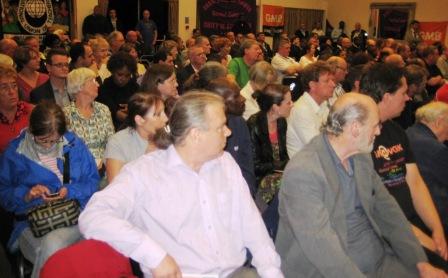Call this an Options Appraisal?
Barnet Council has enlisted the support of consultants to deliver easyCouncil.
This report by iMPOWER is the latest of a long line of reports which surprise surprise promotes privatisation!
To view click here

Branch campaigns
Barnet Council has enlisted the support of consultants to deliver easyCouncil.
This report by iMPOWER is the latest of a long line of reports which surprise surprise promotes privatisation!
To view click here
Listen to a Barnet resident speak at the Barnet Alliance Meeting about the sheltered housing service for his 84 y/o brother
click here
Shirley Franklin – Inspirational.
Shirley told the story of the Save the Whittington Hospital Coalition. Against the odds they began a campaign in the community which grew and grew. 17,000 signatures on a petition to save the A&E. Now that is a challenge.
But signing a petition is not what helped win. By taking the petition into the community they had to speak to residents, so when they needed the support of residents for the march. The residents were already ready and willing to support. As she said residents can’t help if they don’t know what is going on!
John Lister – Powerful
I have heard John speak on the NHS before and he has lost none of his fire and enthusiasm for the battle to defend the NHS. John spoke about the dangers of the White Paper which could see the end of the NHS by 2013 if communities don’t rise up to oppose these attacks. He exposed the waste of public money, the lack of accountability in the White Paper proposals.
Nick Grant – Fightback
Nick got straight to the point that everyone understands. Public Sector workers are under attack, we have to stand up to defend ourselves. Trade Unions need to build alliances with staff and residents. It is not just staff who will face the pain of these attacks, it is everyone using public services. The Academies is a classic example of what this government is trying to do. Academies are seeking to break up state education and despite claims to the contrary, this policy will see the return of the ‘have and have nots!”
Ken Loach – A vision!
Ken reminded the meeting about how the country collectively responded after the Second World War. The country was bankrupt with debts far higher than we face now. Back then we owned Gas, Water, Electricity, Coal, Steel, Transport (Railway, Buses). Yet in spite of the financial crisis, the government created the 8th Wonder of the World otherwise known as the NHS. What an achievement. What vision.
Ken made it clear this was defining point in our history. The Government were embarking on a clear strategy to demolish public services and it is our duty to respond.
Their vision for public services is not our vision.
Our vision is of the community coming together with the Trade Unions to protect public services. Our vision is one where we the community ‘are in it together.’
What next?
First task of the alliance planning meeting next week is to organise a public march across the borough.
If you want to help out, the meeting is being held here


Over 200 staff and residents came down to the public meeting.
This evening marked the begining of the Barnet Alliance for Public Services. It is an Alliance between trade union and the residents.
We heard four excellent speakers talk about the serious attacks staff and residents will be soon facing.
The mood of the meeting was overwhelmingly defiant and eager to take on the challenge.
The First Alliance meeting is next
Wednesday 29 September in South Friern Library at 6 pm.
More details on the evening will be posted later.
Incredible but true if you click on this link you can read this question going to the Full Council.
How could they justify trying to take £17 million from Barnet Council! I am not surprised, but when will councillors wake up to understand the risks to the public purse!
Read the Question below:
Question 47 Councillor Barry Rawlings
What is the latest update on the Catalyst arbitration?
Answer by Councillor Daniel Thomas
The Council received the final partial arbitral award on 26 July 2010. The value of the award to Catalyst is not yet finalised, but a range of £5m to £6m is anticipated, against a claim of between £12-17m.
A detailed report will be considered by Cabinet Resources Committee on 19 October on the implications of the outcome of the arbitration process.
The Council is seeking to enter into a renegotiation of this contract which was created by the previous Labour/Liberal Democrat administration. The renegotiation will be led by the Deputy Chief Executive and Acting Director of Adult Social Services, to manage on-going financial and service delivery risks.
So a new contract means the Council will be looking at a number of Options. One of which will include bringing back what is left of the service in-house.
Barnet UNISON will be launching a campaign to return the service back in-house.
Interesting timing as I saw this article about Fremantle who are the partners with Catalyst.
“Connaught, the property services group that specialises in social housing, is on the brink of going into administration, the BBC has learned.”
Full story click here
Some of you will have seen the above BBC news headline this morning. Connaught was a top 250 FTSE Company not long ago. I am not sure what happens if Connaught goes under. Council Housing still need a repair service and what about the staff. I have written to the Chief Executive asking what the plan is
Barnet Homes staff.
You will be aware that your former colleagues working in council housing repairs are facing an uncertain future. Barnet Homes have served notice a six month on Connaught. Our branch is organising a petition to bring these staff back into to Barnet Homes just as we would do for any of our members.
We are asking all our members, non members to support these workers in their ‘hour of need.’
Our UNISON Convenor Anne Denison and our local reps will be circulating the petition I hope you are all able to sign it.

Sad person that I am, I was trawling through the Cabinet Resources Committee papers. Agenda Item 10 Monitoring 2010/11 Report.
The relevant section:
4.3 The arbitrator in the Catalyst dispute has found partially in favour in Catalyst. The cost to the Council to March 2010 has not been finally determined, but will be up to £6m. The cost will be funded from the risk reserve (currently £17.7m), leaving a reduced balance to manage other risks, including Icelandic bank deposits.
I am very angry. This is public money that will not benefit Barnet residents. Unfortunately I have a long memory and fought hard with UNISON members to oppose this back in 1999.
We produced reports with Professor Dexter Whitfield, opposing the rush to privatise this service, but councillors were being scared into making a rushed and poorly thought out decision.
Unfortunately despite our best efforts and genuine commitment to work with our employer, battle lines were drawn, and none of our recommendations were acknowledged.
The above Deficit Claim by Catalyst Housing (the Partner with Fremantle Trust) ends a long and very bitter four years which has seen the former council workers TUPED to Fremantle Trust have their terms and conditions ripped apart.
The sad fact is public money has been handed over and for what gain?
In the space of a couple of weeks we have seen former council services contracted out in the newspaper headlines Barnet Homes with Edward Meakins, the news of the potential imminent collapse of Connaught the contractor providing council house repairs services and today Catalyst Housing Association .
This is why the Trade Unions are campaigning against the Future Shape programme in its current state.
Very soon I will receive a draft report with proposals to undermine our redundancy scheme and no doubt be informed sometime this year about some pretty savage cuts to public services and redundancy for our members.
How we could do with that £6 million now, and don’t get me started about Icelandic Banks!
I am so angry.
It has been a matter of public record that Connaught have been experiencing serious issues
The latest share price 13.84p
http://investing.thisismoney.co.uk/companyresearch/11390/Connaught/company_research.html
Barnet UNISON members working for Connaught were told they had been served notice by barnet Homes. Our members who less than 5 years ago were working for barnet council ensure repairs and maintenance of the council housing stock. They have been transferred two times and face a third transfer in less than 6 years!
Barnet Homes have served notice on Connaught that they intend to terminate their contract with them in February 2011. This six month notice period is in accordance with terms laid out in the original contract.
The two questions
· Who will provide the service in future for council tenants?
· What will happen to the staff?
Barnet Homes are going out to procurement for all of their future maintenance suppliers, so an organisation or organisations are likely to be appointed in due course.
Barnet UNISON have already asked that the staff are TUPED back to Barnet Homes, whilst I understand that will be one of the options looked at it is the Option we want to happen.
We are therefore asking Barnet Homes staff to sign our petition to bring this workforce back to Barnet Homes.
Please contact UNISON Convenor Anne Denison for a copy of the form or you can download the form online here.